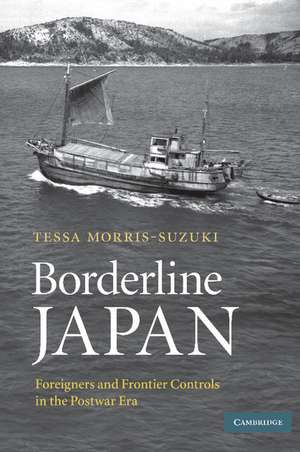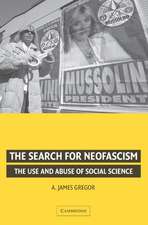Borderline Japan: Foreigners and Frontier Controls in the Postwar Era
Autor Tessa Morris-Suzukien Limba Engleză Paperback – 11 ian 2012
| Toate formatele și edițiile | Preț | Express |
|---|---|---|
| Paperback (1) | 286.51 lei 6-8 săpt. | |
| Cambridge University Press – 11 ian 2012 | 286.51 lei 6-8 săpt. | |
| Hardback (1) | 748.83 lei 6-8 săpt. | |
| Cambridge University Press – 7 apr 2010 | 748.83 lei 6-8 săpt. |
Preț: 286.51 lei
Nou
Puncte Express: 430
Preț estimativ în valută:
54.83€ • 58.63$ • 45.71£
54.83€ • 58.63$ • 45.71£
Carte tipărită la comandă
Livrare economică 17 aprilie-01 mai
Preluare comenzi: 021 569.72.76
Specificații
ISBN-13: 9780521683104
ISBN-10: 0521683106
Pagini: 286
Dimensiuni: 152 x 229 x 16 mm
Greutate: 0.42 kg
Editura: Cambridge University Press
Colecția Cambridge University Press
Locul publicării:Cambridge, United Kingdom
ISBN-10: 0521683106
Pagini: 286
Dimensiuni: 152 x 229 x 16 mm
Greutate: 0.42 kg
Editura: Cambridge University Press
Colecția Cambridge University Press
Locul publicării:Cambridge, United Kingdom
Cuprins
Introduction; 1. Border politics: rethinking Japan's migration controls; 2. Drawing the line: from empire to Cold War; 3. Crossing the line: 'unauthorized arrivals' in occupied Japan; 4. Guarding the line: the Cold War and the immigration bureau; 5. A place apart I: the armed archipelago; 6. A place apart II: the liminal world of Ōmura; 7. Special permission to stay: 'hidden lives' in postwar Japan; 8. A point of no return: repatriation to China and North Korea; 9. Beyond the postwar system: what changed; what stayed the same?
Recenzii
“Unlike much academic writing, Tessa Morris-Suzuki’s work is almost always clearly written and jargon-free, impeccably researched and, above all, original… Morris-Suzuki’s writing is consistently innovative and thought-provoking. Her new work, Borderline Japan, is no exception…Morris-Suzuki’s book should not only be considered required reading for Japanese Studies scholars and students, but for all Japanese who are unaware of the circumstances and sufferings of non-Japanese, the vast majority of whom wanted and continue to want nothing more than to peacefully work and live in—and travel in and out of—a country they have come to call home.” -Chris Burgess, Tsuda College, Pacific Affairs
Descriere
This book shows how the Cold War played a decisive role in shaping Japan's migration controls, examining the origins of migration policy.

















